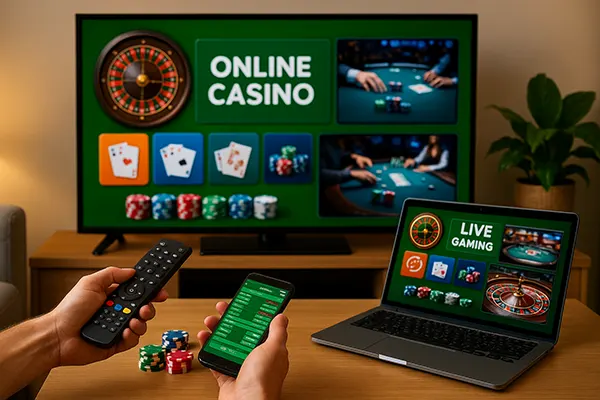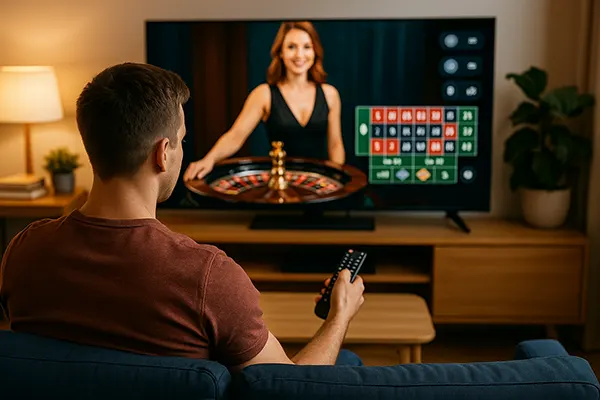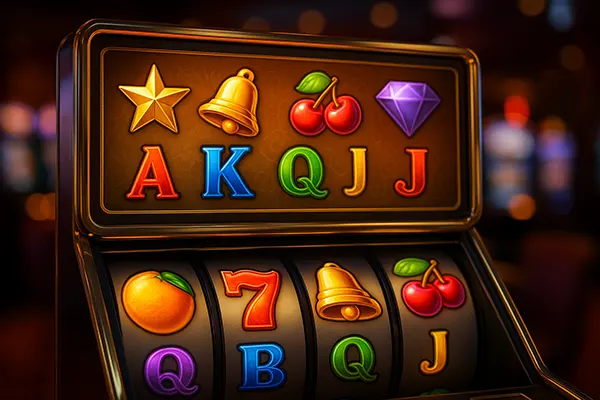
Online Gambling on Smart TVs: New Trend or Misguided Path?
Smart TVs are no longer limited to streaming films or browsing YouTube. In 2025, the fusion of online gambling with smart television functionality is gaining traction. With enhanced connectivity, faster processors, and native app support, users now access gambling services directly from their living room screens. But does this evolution represent a true breakthrough, or is it merely a gimmick?
The Rise of Gambling Through Smart TVs
The last two years have shown an increasing number of gambling operators offering smart TV-compatible services. Some major providers developed native apps available via Samsung Tizen or LG WebOS, letting players log in, make bets, and even watch live dealer games—all without switching devices.
Streaming quality and interface design have also improved. The 2025 models offer 4K or 8K resolutions, stable Wi-Fi 6E connections, and voice-command support, which collectively elevate the remote gambling experience. These factors have enabled seamless integration into daily home entertainment routines.
Denmark, the UK, and Canada have been among the early adopters. Industry data from June 2025 suggests that over 12% of regular online casino players in these markets have interacted with gambling content through their smart TVs at least once monthly.
Security and Authentication Concerns
Despite convenience, concerns arise regarding security. Most smart TVs lack advanced hardware for biometric authentication, relying instead on passwords or PINs. This creates vulnerabilities, particularly in shared households or among underaged users.
As of June 2025, no universal industry standard for smart TV gambling authentication exists. While some operators now implement two-factor authentication (2FA) via mobile synchronisation, enforcement remains inconsistent.
Furthermore, many smart TVs run outdated operating systems, which are more susceptible to cyber threats. Users who don’t frequently update firmware may unknowingly expose themselves to risks, including unauthorised account access or stolen financial details.
User Experience: Is Bigger Better?
For live dealer games and immersive video slots, smart TVs offer a stunning visual experience. Users enjoy larger screens, ambient sound integration, and better ergonomics compared to mobile play. This visual appeal enhances engagement, especially during long gaming sessions.
However, the experience is not universally positive. Navigating menus using a TV remote can be cumbersome. Unlike smartphones or tablets, TVs lack touchscreens or high-speed input interfaces, which leads to slower gameplay, particularly in games requiring swift interaction, such as poker or crash games.
Another factor is the physical setting. Gambling in front of a TV often implies a social or family space, which may not be appropriate for such activities. Critics warn that this can blur boundaries between entertainment and addictive behaviour, normalising gambling as a routine pastime.
Demographic Trends and Usage Patterns
Smart TV gambling attracts a specific demographic—primarily users aged 35 to 55 with above-average tech literacy and disposable income. Unlike mobile users, this group prefers leisure gambling in a home-based setting rather than on-the-go sessions.
In June 2025, a market survey by iTech Reports showed that 64% of smart TV gamblers engaged in live roulette or blackjack, while only 19% explored slot machines. This suggests a clear preference for live, broadcast-style formats that match the TV medium’s strengths.
Interestingly, the average session length was notably longer—around 47 minutes—compared to 23 minutes for mobile users. This points to a different consumption pattern, where smart TV use supports extended play but requires careful regulation to prevent harm.

Regulatory and Industry Implications
From a legal perspective, integrating gambling into smart TVs presents new regulatory challenges. Most national regulators focus on browser and mobile environments. However, app-based services on smart TVs blur lines between traditional gaming and streaming media.
As of mid-2025, countries like Sweden and the Netherlands have initiated consultations to evaluate the regulation of gambling via smart TVs. Questions regarding parental control, app store accountability, and advertising standards remain unresolved but under review.
Gambling operators must also adjust responsible gaming tools for this new medium. The Danish Gambling Authority now requires smart TV apps to include time limits and activity alerts that display prominently on screen—similar to pop-ups used in web versions.
Future Prospects and Technological Development
Looking ahead, integration with smart home ecosystems could push the concept further. Imagine voice-activated betting via Alexa or Google Home, or syncing gambling accounts with home entertainment profiles to suggest tailored games based on viewing habits.
Some prototype features being tested in Q2 2025 include gesture controls and AI-driven game suggestions, aiming to make smart TV gambling more intuitive. However, these also introduce new ethical debates about over-personalisation and privacy.
Whether smart TVs become a dominant gambling medium remains to be seen. But one thing is clear—operators, regulators, and users must collaborate to ensure innovation does not compromise safety and integrity.
Popular
-
No-deposit casino bonuses: the restriction...
No-deposit bonuses can look straightforward: you register, …

-
No Deposit Bonuses: Conditions, Risks, and...
No deposit bonuses remain one of the …

-
How to Evaluate Slot Risk Level Using the ...
Understanding the risk profile of a slot …

